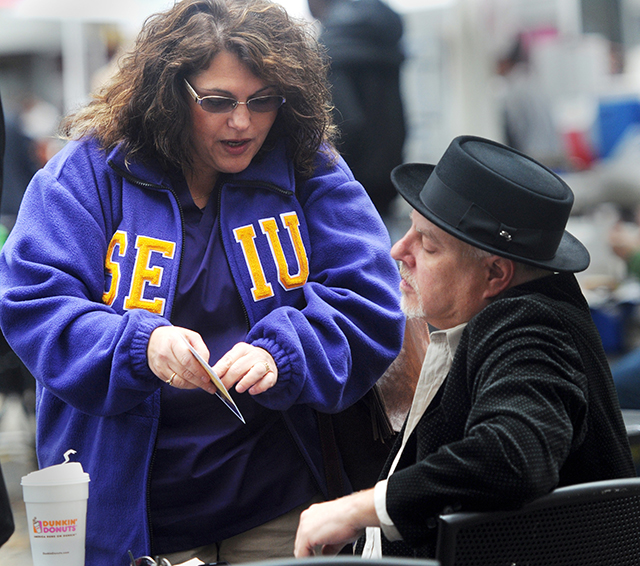While union workers go door to door in California to recruit dues-paying providers of home care services, union officials push a ballot initiative that could unravel the family ties in those same services.
If voters approve the proposal, California residents who offer personalized services to needy family members in their homes would be required to get 75 hours of training that advocates view as counterproductive and burdensome.
Combined with Gov. Jerry Brown’s proposed cap on work hours to avoid overtime expenses, they say, the change threatens the practicality and affordability of caring for relatives at home.
“In many instances, we are talking about mothers taking care of their disabled children,” says Jennifer Parrish, an opponent of similar union actions in Minnesota, where she has an in-home child care business. “They understand the full spectrum of specialized needs. So why put them into a lengthy training program that will subtract away from their time at home?”
Californians who are part of a program called In-Home Support Services (IHSS) have collected almost a thousand signatures in opposition to the ballot question. The in-home program — funded through Medi-Cal, the state’s Medicare plan — organizes services for senior citizens and the disabled. The idea is to allow consumers to remain at home under the care of relatives, thus avoiding nursing homes and similar facilities.
Family members who work as personal care assistants must pay union dues, which are used to support the very ballot initiative that program participants oppose. Put another way, care givers must spend part of their work day financing political activities that they believe undercut the best interests of their families.
The arrangement is what’s at issue in the U.S. Supreme Court case known as Harris v. Quinn. Pamela Harris, an Illinois resident, cares for her disabled son at home. Citing the First Amendment, she and others argue that it’s unconstitutional for state laws to compel in-home care givers to pay union dues and accept a union as their exclusive representative to the government.
The Foundry previously reported that the United Long-Term Care Workers’ Union, an arm of the Service Employees International Union (SEIU), is conducting a membership drive in rural areas of California in and around Mendocino County. The SEIU affiliate’s aim appears to be drawing in non-union in-home care workers and locking in their dues payments should the Supreme Court rule against labor in the Harris case.
The Foundry recounted the experience of Linda Dobbs, a Mendocino resident who was visited by two union workers. Dobbs, 52, resisted their overtures, knowing that if the high court rules in favor of the plaintiffs, she no longer would be required to pay union dues for caring for her daughter at home.
However, Dobbs suspects the SEIU affiliate will be successful in drawing other workers into the fold because the section of the membership form that commits signers to future payments is in hard-to-read fine print.
“If you were to sign off,” Dobbs tells The Foundry, “you would able to get out of paying dues at some point, but not right away, and not [until] after jumping through a lot of hoops.”
Across the country in Rochester, Minn., Parrish has closely watched the situation in California. As someone who has a stake in challenges to union dues on free speech grounds, she recommends taking a hard look at financial disclosure forms, known as LM-2s, available through the federal Department of Labor. According to its LM-2, the SEIU affiliate last year pulled in over $50 million in dues and fees.
“The LM-2 also lists the non-union member fee payers, also known as fair share payers,” Parrish explains in an interview with The Foundry. “When you see what the numbers are, it shows why this SEIU affiliate is frantically pushing membership cards at this time.”
The form lists 170,000 members, of whom 81,000 are non-union fee payers.
“So, if they want to grow their membership, this is where they go,” says Parrish, whose in-home child care business is about 90 minutes south of Minneapolis. She is the lead plaintiff in Parrish v. Dayton, a lawsuit seeking to overturn a state law that forces child care operators into unions. (The Parrish suit is on appeal pending the outcome in Harris.) Parrish says:
No matter what state you’re in, you should not be forced to pay union dues that go to support political activities that conflict with your beliefs and what you think are in your best interests. There are a lot of policy proposals the unions support that are not good for my business and [the] business of other home-based child care workers.”
SEIU officials did not respond to repeated requests by The Foundry for comment on its efforts.
The union successfully lobbied the Department of Labor to institute a rule change under the Fair Labor Standards Act requiring states to pay overtime to home care workers.
That rule change resulted in an unfunded mandate that cash-strapped California officials say they can’t cover. Brown, the Democratic governor, responded by proposing to avoid overtime expenses by capping the paid work week for home care providers at 40 hours.
“The SEIU is pushing a highly cumbersome, one-size-fits-all approach to training in California that misses the whole point of having family members care for their own,” Parrish says.
The Supreme Court heard oral arguments in Harris in January. The court is expected to issue a decision this spring.
This story was produced by The Foundry’s news team. Nothing here should be construed as necessarily reflecting the views of The Heritage Foundation.
